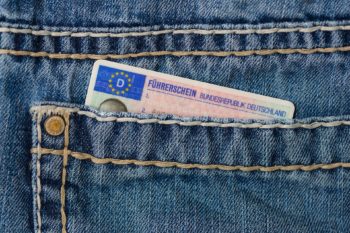Learning to Drive in German Posted by Larissa on Nov 23, 2021 in Vocabulary
After living in Germany for nine years, I have finally learned how to drive and I successfully passed my test a few months ago. Here are some tips and vocabulary if you also want to do your Führerschein in Germany.
Der Ablauf
The Process
First of all, there are different types of driving licenses. The most common Führerschein (driving license) is Klasse B, which is how to drive a car. Here are the rest:
Führerscheinklasse B für PKW is driving license B for a car (PKW = Personenkraftwagen = person carrier)
Führerscheinklasse BE für PKW mit Anhänger is driving license BE for a car with trailer
Führerscheinklasse A/1/2/M für Motorrad is a driving license for a motorbike (the different letters depend on how fast the motorbike is and also from what age you can ride).
Führerscheinklasse C1/C1E für LKW is a driving license for a lorry, or truck (LKW = Lastkraftwagen = heavy goods vehicle/truck
Theoriestunden
Theory Classes
In Germany you have to go to what are known in Germany as theory classes before you can take the theory test. How many theory classes you need to do depends on which driving license you need. For example, for a standard B driving license you need to take 14 classes.
Fahrstunden
Driving Lessons
There are a certain amount of special lessons you need to do before you can take your exam in Germany. For a standard B driving license, you need to have completed the following:
Fünf Fahrstunden auf Landstraße five driving lessons on a country road
Vier Fahrstunden auf der Autobahn four driving lessons on the motorway
Drei Fahrstunden in der Nacht three driving lessons at night
Once you have completed these steps you are able to take the practical test. In the practical driving test, your Fahrlehrer (driving instructor) sits next to you as they normally would. The Fahrprüfer (driving examiner) sits behind the driving instructor and will give you the instructions on where to go.
When you have successfully passed the theory and practical test, you will get your Führerschein (driving license) and have a two year Probezeit (probation), which means you are a Fahranfänger (a driving beginner). During these two years you have an Alkoholverbot (an alcohol ban) and even have a slower speed limit when driving in other countries such as in Italy and Croatia.
Helpful Vocabulary
der Führerschein the driving license
das Auto the car
die Fahrschule the driving school
der Fahranfänger the driving beginner (male)
die Fahranfängerin the driving beginner (female)
die Probezeit the probation period
das Alkoholverbot the alcohol ban
der Fahrprüfer the driving examiner (male)
die Fahrprüferin the driving examiner (female)
der Fahrlehrer the driving instructor (male)
die Fahrlehrerin the driving instructor (female)
die Fahrstunde the driving lesson
die Anweisungen the instructions
bestanden passed
durchgefallen failed
Here are some more posts about driving in Germany, just click here and here. Do you have any other questions? Leave me a comment below.
Thanks for reading,
Larissa

Build vocabulary, practice pronunciation, and more with Transparent Language Online. Available anytime, anywhere, on any device.





Comments:
DJJG:
Thank you! I started reading these in September, and I enjoy them very much. Btw, it would be “two-year Probezeit” in English punctuation instead “two year Probezeit.” I don’t know how that would be in German–probably some compound wording instead of hyphenation. But thank you again!
jan barriault:
you do these Blogs so well! love them, especially how you choose the content!! variety and humor while i learn?? what’s not to love!!
Larissa:
@jan barriault Thank you so much Jan, I’m glad you enjoy them!